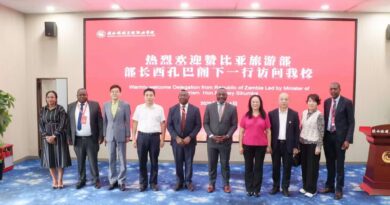African Leaders Launch ALMA Consortium to Spearhead Research on Child Brain Health
The African Leadership for Measuring Brain Health in Children and Adolescents (ALMA) Consortium was officially launched today. The launch event, held in Lusaka, Zambia, featured a speech by the Minister of Education, Hon. Douglas Syakalima, MP.
The ALMA Consortium, co-led by two African-run research institutes in Nairobi and Cape Town – the Aga Khan University Institute for Human Development (IHD) and the University of Cape Town (UCT) Neuroscience Institute that seeks to advance scientific understanding of the complexities of brain development in African children and adolescents.
During his speech, Minister Syakalima highlighted the critical period of child development, emphasizing the accelerated physical, cognitive, and social-emotional growth.
He pointed out that brain development during this period is heavily influenced by the environment and genetics, with poverty-driven factors impacting Sub-Saharan Africa, home to 500 million children under the age of 18.
The minister outlined three central gaps in knowledge within African neurosciences, emphasizing the lack of understanding of the interaction between African environments and biology in brain development, limited ability to measure variance in brain function and behavior, and restricted access to neuro-developmental interventions with evidence of effectiveness and scalability.
The ALMA Consortium aims to address these gaps through an interdisciplinary approach, focusing on the ABCD model: advancing the science of brain health, building scientific leadership, consolidating research institutions, and driving community change.
The initiative will analyze existing African data and supplement it with primary data collected by fellows, exploring three key topics: mechanisms of brain development, measurement of brain function and behavior, and interventions to promote child development.
The network will play a crucial role in building the leadership and scientific skills of 45 African fellows, with a commitment to a 2:1 ratio of women to men.
Minister Syakalima expressed delight in the consortium’s commitment to promoting women’s participation in science, aligning with the government’s priorities and the global agenda for increased participation of women in STEM fields.
The ALMA Consortium has garnered support from various partners and collaborators, including the University of Malawi, University of Zambia, the Broad Institute of MIT and Harvard, and the University of Oxford, with collaborators in Kenya, Uganda, Ethiopia, and Ghana.
Funding partners for the initiative include the Science for Africa Foundation (SFA Foundation) and the UK Foreign Commonwealth and Development Office (FCDO).
In conclusion, Minister Syakalima expressed optimism for the transformative impact of the consortium on the lives of children and adolescents in Africa, urging a reaffirmation of the commitment to advancing the well-being and potential of every young child for a thriving start.
The event was attended by international delegates, and the minister invited them to explore the beauty and hospitality of Zambia during their stay.



